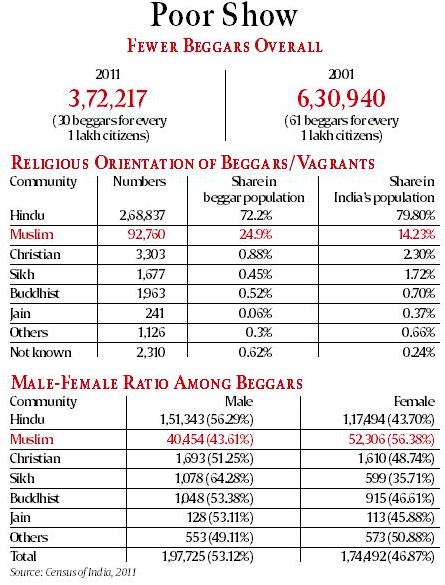Nearly 25 percent of the 3.7 lakh Indians categorised as "beggars" in the 2011 Census are Muslims, according to data released last month. While most of beggars in India are Hindus—about 72.2 percent—Hindus are also the majority religious group in India, accounting for almost four-fifths of the country's population.

The number of Muslim beggars is significant as compared to their overall population in India, which stands at 17.22 crore as per the last Census.
A majority of the Muslim beggars are women, which is contrary to the national trend, where there are fewer women beggars compared to men.
Earlier, reports have indicated that Muslims have the lowest living standard in India, and spend less than Rs 33 every day.
Activists claim that the data — released last month — on the religious orientation of those deemed non workers' in Census 2011, highlights, once again, the limited or unequal access that certain communities or groups of citizens have to government schemes and services, which pushes them to destitution.
Non workers' are defined in the Census as individuals who do not participate in any economic activity — paid or unpaid — household duties, or cultivation.
As per Census data, of the total 72.89 crore non workers, 3.7 lakh are beggars. This number fell 41% since the last Census of 2001, which recorded the number of beggars at 6.3 lakh.
Muslims make up an unusually high percentage of individuals who have been categorised as beggars. A total of 92,760 Muslims are categorised thus — a quarter of the country's total beggar population of 3.7 lakh.
Hindus are 79.8% of India's population, but with 2.68 lakh individuals, make up 72.22% of its beggar population. Christians, who are 2.3% of the population, make up 0.88% of the beggar population (3,303 individuals). Buddhists (0.52%), Sikhs (0.45%), Jains (0.06%) and others (0.30%) follow.
Interestingly, more Muslim women seem to be begging as compared to Muslim men, a trend that is opposite to that of all communities except those categorised as Others'. The national average is 53.13% male beggars to 46.87% female beggars; for Muslims, the ratio is 43.61% male beggars and 56.38% female.

Begging is illegal
Beggary is illegal in India, and is punishable by imprisonment of 3-10 years. The Bombay Prevention of Begging Act, 1959 has been followed by almost all states in the country. Activists say the Act provides no clear categorisation of beggars, and even homeless and landless labourers who have migrated to different cities are categorised as beggars. Like many of India's laws, the anti-beggary legislation is based on an archaic British law against vagrants.
Under the Bombay Prevention of Begging Act, 1959, anyone having no visible means of subsistence and found wandering about in a public space is deemed as a beggar. All those who solicit alms in a public place under any pretence including singing, dancing, fortune-telling or street performing are also deemed as beggars.
The Act gives discretionary powers to the police to pick up anyone on suspicion that he is a beggar or a destitute with no means of fending for himself.
Activists say the law, rather than rehabilitating destitutes, criminalises the poor and those suffering from mental illnesses. Some states like Bihar have undertaken a programme for the rehabilitation of beggars. But other states like Maharashtra and West Bengal can put away an individual found on the street to prison.







Comments
Beggers are beggers, why religion is coming in everything nowadays?!
@kr.....
whats your problem yaar, convent ho ya private...what it has to go with beggers....?
Half of Hindu population are studying in convent school... How many muslim study in convent.... They say is non Islamic.... I heard my neighborhood saying it
Add new comment